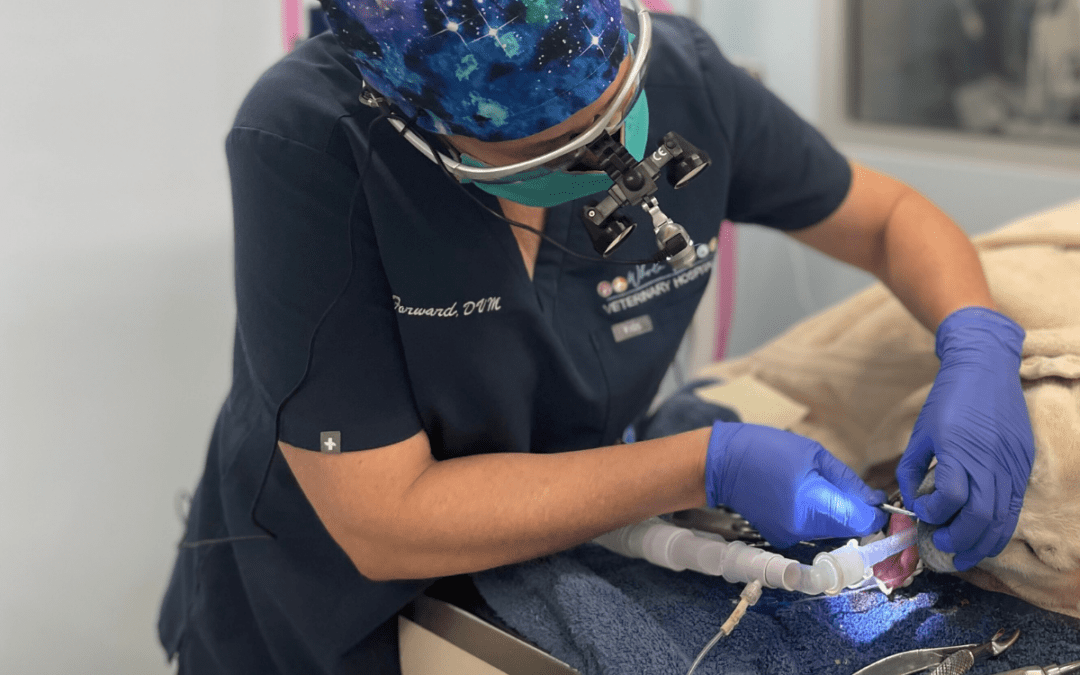With dental health month coming up next month, it is important to discuss the health of your dog and cat’s teeth. Dental disease is often overlooked until it is too late. Dental disease at the later, more severe, stages is referred to as periodontal disease. Periodontal disease has been referred to as the “silent killer” in our pets because often, dental disease is ignored with no brushing, no dentals, etc until the patient is a senior and has severe periodontal disease that can lead to fatal and systemic concerns such as heart or kidney disease, etc. Also, if you have ever had a bad tooth or sore in your mouth, you know from experience that dental disease can be quite painful for our pets. Therefore, it is important to manage ongoing oral health with brushing and routine dentals before it is too late.
Your veterinarian will grade your dog or cat’s teeth between a grade of 0 to 4, with 4 being the most severe Periodontal disease, during yearly exams. A dental is when you have your pet’s teeth scaled, cleaned and polished under anesthesia. The dental is performed just as you and I have our teeth cleaned by the hygienist every 6 months, and thoroughly examined by our Dentist, even using the same equipment. However, it isn’t practical for our pets to have their teeth cleaned as often as we do, since they have to undergo anesthesia. Anesthesia is performed since a dog or cat will not sit in a chair and hold their mouth open, and for the safety of the pet by preventing them from inhaling fluid and bacteria into their lungs during the cleaning. Your vet will recommend when a dental is indicated. If your pet has a grade 0 or 1 (gingivitis) out of 4, this is more of a prophylactic cleaning like you and I have performed, and the teeth at a grade 1 will return to a grade 0 following a dental. If your pet has a grade 2-4, this is periodontal disease and further dental work such as dental extractions by the vet may be indicated. Radiographs to see below the gum line, where we can’t see on routine exams, are performed to determine if extractions are indicated. The dental also provides the opportunity for a full oral cavity exam, looking for any other concerns that may need to be addressed. Patients do well following extractions and feel much better. It doesn’t affect their ability to chew and they do not miss these teeth that are extracted. If dentals are performed at lower grades and earlier in the life of the pet, it can lower the need for extractions later in life.
Lastly, it is phenomenal if you are able to take the time and brush your pet’s teeth two to three times a week. Smaller dogs tend to have more severe dental disease than larger dogs, but this is not always the case. Certain breeds also are known for developing dental disease such as greyhounds, Italian greyhounds, dachshunds, yorkies, chihuahuas, etc. If it is safe, based on your pet’s behavior, you can train them to allow for you to brush their teeth using a soft bristle toothbrush and veterinary toothpaste such as CET by Virbac. Start by using your finger to desensitize them from having their teeth brushed, then add toothpaste and slowly add in the toothbrush. Concentrate on the outer teeth which have the most tartar build up. You do not have to lift the lip and watch what you are doing. Hold the muzzle and place the brush under the lip which prevents them from chewing the toothbrush. It is helpful if you have someone to hold your pet for you while you attempt this. Start with short sessions and ease into it. Regular brushing can reduce the amount of tartar, help with bad breath, and slow the progression of developing periodontal disease. This may also reduce the number of times your dog may need a dental.
However, it is still important to have your vet perform yearly exams and inform you of when your pet needs a dental. Prophylactic dentals are still more helpful than brushing alone. Many owners think that chewing alone can provide dental health, but unfortunately, this alone is not enough. Just as with your dental health, chewing and dental supplements do help, but not as much as brushing and regular dentals. Optimal dental health requires a good whole food, limited ingredient, high quality diet, recommended safe treats/veggies, regular brushing, and periodic dentals. Following these guidelines can lead to a long life of oral health for your pet!

